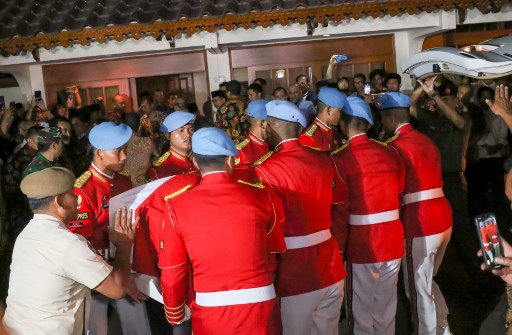Former Indonesian President B. J. Habibie, who passed away at the age of 83 yesterday evening due to reported heart failure, will be buried next to his beloved wife Hasri Ainun Besari at the Kalibata Heroes Cemetery in South Jakarta this afternoon.
According to reports, Habibie’s funeral procession is scheduled to start his residence in Kuningan, South Jakarta at 1pm, with his burial ceremony expected to commence at 1:30pm.
President Joko Widodo is expected to lead the burial ceremony.
Habibie will be laid to rest next to his wife Ainun, who passed away in 2010. The pair married in 1962, and their love story was well documented in Habibie’s memoir about Ainun following her passing. The book was then adapted into the film Habibie & Ainun in 2012, which went on to become one of the highest grossing domestic films that year.
Police and military personnel will be deployed to the Kalibata Heroes Cemetery to manage crowds at the funeral, as officials are expecting many members of the public to come and pay their final respects.
The government has urged Indonesians to raise the flag at half-mast for the next three days as a symbol of national mourning.
Habibie ushered in an era of democratic reforms after the downfall of long-time dictator Suharto.
In a televised speech announcing Habibie’s death, President Joko Widodo called the former aircraft engineer and politician a “world-class scientist” and “the father of Indonesian technology.”
Habibie was born in June 1936 in a small town in South Sulawesi, and studied aviation and aerospace engineering in Germany and the Netherlands before returning home in the mid-1970s.
Suharto asked him to help industrialize the country. He chaired the state-owned aviation company Industri Pesawat Terbang Nusantara and then served as minister of research and technology for 20 years.
Habibie was sworn in as Indonesia’s third president in 1998, just two months after becoming vice president to Suharto, who ruled for three decades until mass protests forced his resignation.
Habibie helped usher in a transition to democracy for the world’s most populous Muslim nation and stabilized the economy, which was reeling from the Asian financial crisis and decades of corruption.
In a surprise move in 1999, Habibie announced a referendum on independence for East Timor, a former Portuguese colony ruled by Indonesia.
The vote was held later that year and the East Timorese overwhelmingly voted for independence, sparking a wave of deadly unrest.
Habibie served for just 17 months as president — he withdrew from contention in the October 1999 election and was succeeded by Abdurrahman Wahid.
He is survived by two sons.
With additional reporting by AFP




